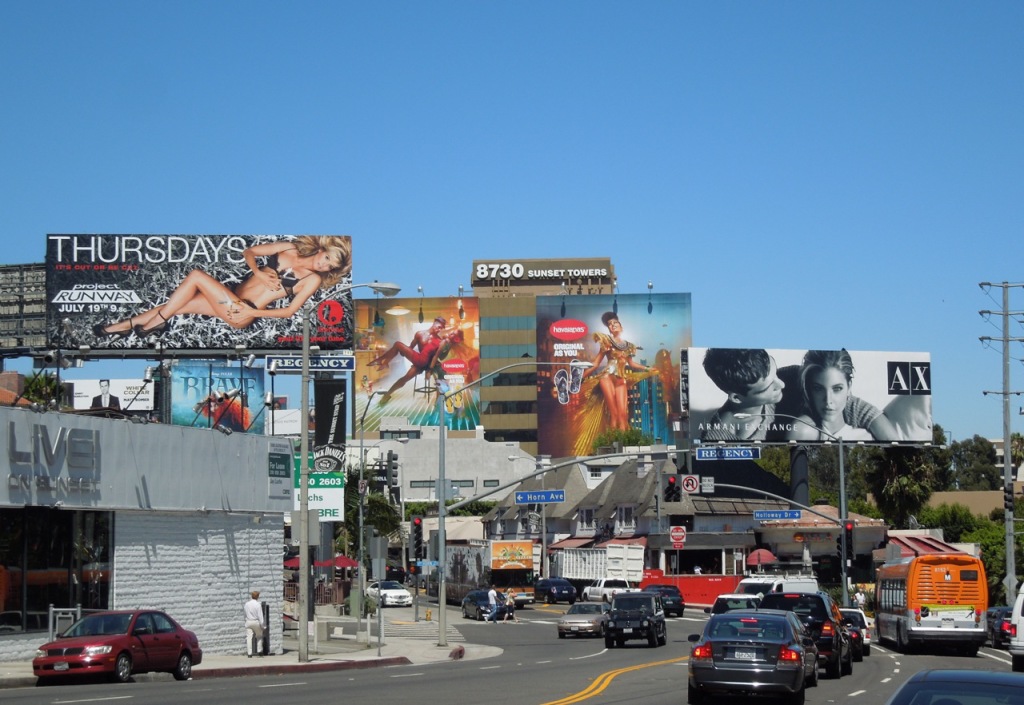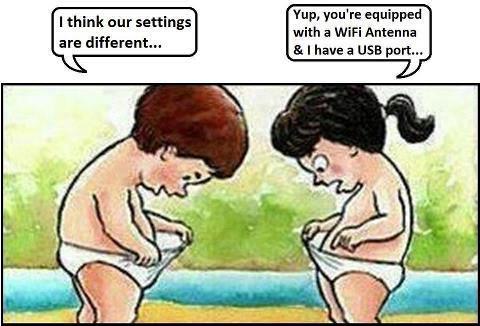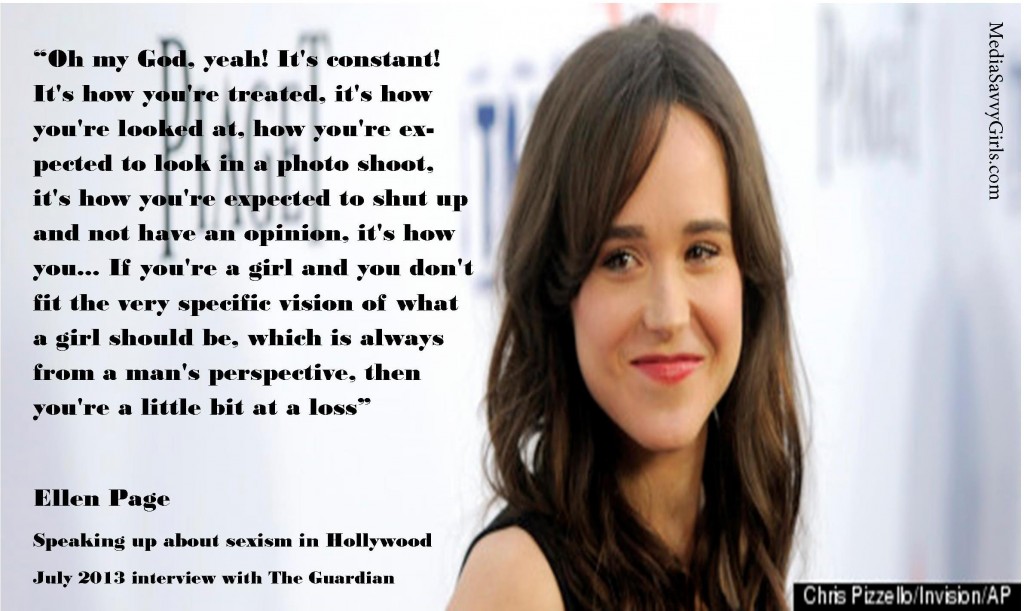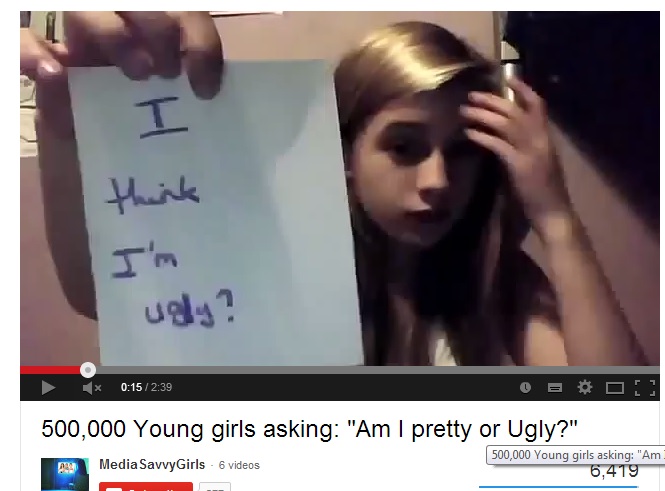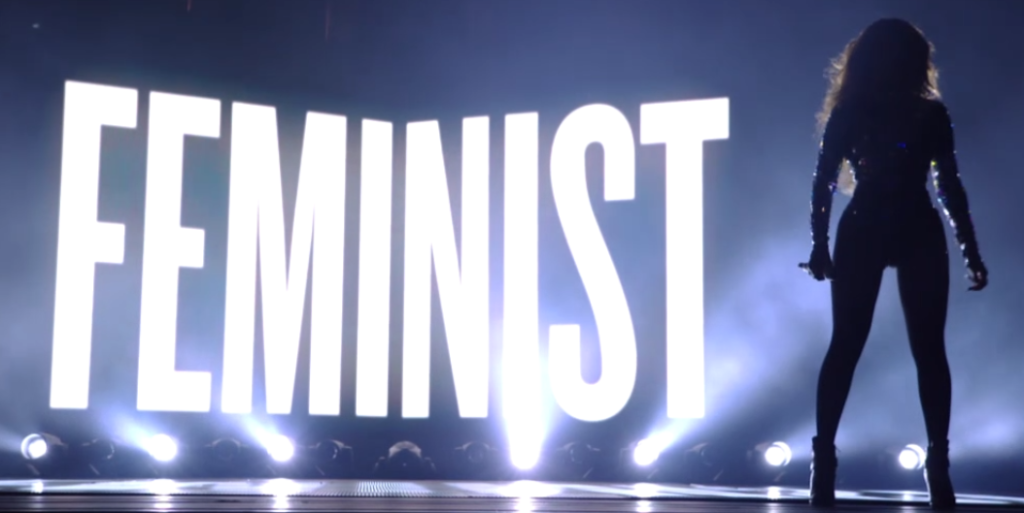
“Feminism is flawed, but it offers, at its best, a way to navigate this shifting cultural climate. Feminism has certainly helped me find my voice. Feminism has helped me believe my voice matters, even in this world where there are so many voices demanding to be heard. How do we reconcile the imperfections of feminism with all the good it can do? In truth, feminism is flawed because it is a movement powered by people and people are inherently flawed. For whatever reason, we hold feminism to an unreasonable standard where the movement must be everything we want and must always make the best choices. When feminism fall short of our expectations, we decide that the problem is with feminism rather than with the flawed people who act in the name of the movement.”
Roxane Gay “Bad feminist” (2014)
That moment at the 2014 MTV Video Music Awards when the queen herself, Beyoncé, dramatically slid across the stage with the word FEMINIST emblazoned in massive letters behind her is undoubtedly unforgettable. With her tight, glittering outfit, perfectly made-up appearance, and her status as both a career woman and a devoted wife and mother, Beyoncé single-handedly and single-mindedly embodied the major characteristics of third wave feminism, bringing the whole package to the viewers everywhere in one gloriously dramatic show of theatrics. In that moment we all knew modern feminism had arrived, right? Most major publications seem to think so, including Times Magazine, and the Twitter hubbub that followed Beyoncé’s performance was largely excited and favourable. Even Taylor Swift, who once avoided feminism as she felt it pit “girls against boys”, jumped on the bandwagon. Seemingly overnight, celebrity feminism became a bona fide phenomenon.
All appears well, at first glance, with this large-scale embrace of a word that, in years prior, was polarizing at best. True to its message that one can love men, be freely sexual, and celebrate one’s femininity (reclaiming it as a source of personal power), modern feminism has been key to banishing the old negative stereotypes associated with the “other F word”. And to its credit, one is no longer automatically presumed, by most, to be a lesbian, a “man hater”, or a prude, if one self-identifies as a feminist.
Despite the gleaming surface and celebrity endorsements, however, modern feminism – or fourth wave feminism as some has suggested (see Baumgardner 2011, Cochrane 2013, Munro 2013, Penny 2014) (1) – has been experiencing some serious criticism, even all-out backlash. Feminism is not, in fact, new. Nor is its celebrity cachet; indeed, modern feminism is not currently doing anything truly revolutionary in terms of feminism’s perception in popular culture (even if Twitter and the news media seem to think it is). The Spice Girls were conveying roughly the same message to the masses that Beyoncé is twenty years ago, back when third wave feminism was just getting started. In fact, this last wave feminism has been bound together with celebrities and popular culture more or less since its inception.
The issue – according to celebrity feminism‘s detractors – is that feminism is not, at base, about popular culture, or even popular perception, but that it’s about systemic change and that this, arguably, may be where modern feminism is failing, raising the question of whether celebrities taking up the cause is helping the movement, or hindering it via distraction and glossy misrepresentation. These detractors are not without a point: throughout the western world over the last decade, women’s rights have either not made significant gains or, in some regions, have moved backwards. In the United States, for example, state politicians have enacted more than 200 restrictions over the last four years that make it harder for women to obtain safe, legal abortion care. To put that in perspective, that’s more restrictions in just four years than were enacted over the whole of the previous decade. (2) Likewise, in the UK, anti-abortion lobbyists have grown more aggressive, waging what the UK Times calls a “stealth war” on abortion rights. (3)
Speaking of the USA again, there has also been increasing pressure in many states to limit access to birth control. Already in some states, such as Arizona, a woman’s boss has the power to deny her insurance coverage for birth control if she is taking it for contraceptive reasons. (4) Goals like “securing the right to an abortion”, and “making it acceptable for women to delay or space their children with birth control, or even to not have children at all”, were the causes of second wave feminists. (5) How is it that modern feminism has the word “feminism” appearing everywhere in popular culture and social media, while the actual sum of women’s rights stagnates or erodes? Even the #glassceiling — something second wave feminists were relying on their daughters to break, building upon the gains the second wavers had made for women in the workplace over the span of their careers — remains securely in place.
According to a recent Wall Street Journal/Gallup survey, half of all female managers named reasons related to their gender as what is holding them back at work, including: “male chauvinism, attitudes toward a female boss, slow advancement for women, and the simple fact of being a woman.” Likewise, 61% of the women executives reported having been mistaken for a secretary at a business meeting; 25% said they had been thwarted on their way up the ladder by male attitudes toward women, and 70% believed they are paid less than men of equal ability. (6)
Meanwhile, the popular #everydaysexism project launched by Laura Bates in 2012 has collected over 50,000 personal statements from all over the world documenting actual experiences of sexism. All of this begs the question: have we allowed modern feminism to lose its focus? In an effort to make feminism more welcoming and inclusive, are we watering down what it really means?
Yes, we probably have and are, but to blame celebrity involvement alone for this would be terribly short-sighted. The real problem with modern feminism may lie within the movement itself, and how, in its efforts to be “all-inclusive” (breaking down barriers created by race and gender orientation), it has sadly and ironically become splintered and full of exclusive sects. Many third wave feminists report finding themselves shut down or unwelcome in conversations if their sexual orientation or race doesn’t match the mainstream. Thus, feminists who happen to be people of colour and gay feel unwelcomed among feminists who are heterosexual white (and viceversa), or if they happen to be cisgendered among transgendered individuals (and viceversa). But these divisions exist not in the ideals helded up by feminism; they are simply created by people’s different perspectives: some class/group of people feel more oppressed than others and wrongly excluded from the conversation, while some other class/group of people feel guilty and far too privileged than others. These feeling create barriers and barriers that painfully obstruct communication and progress. In forums and articles across the web, I read about different experiences and contrasting points of view: some white — along with male feminists—feel accused of “derailing” conversations, not checking their “privilege” enough, and generally taking the focus off the people who — by their own estimation—really matter in that conversation, because they are the ones who are really oppressed. Take, for example, the experience of Generation-Y feminist and writer Devon Murphy:
“For as long as I can remember, I have been a feminist and proud of it. You could say I fell in love early, and like one who had found a high school sweetheart, I barely turned my head to see what other options were available. But now that I’m in my mid-20s, things seem a lot murkier. While I will always consider myself a feminist at heart, it’s no longer the simple movement I signed up for as a child. It isn’t just peace signs, birth control pills and that extra 30 cents on the dollar. What I once saw as a solid rock of ideals turned out to be a prism. And the more light that shines on it, the more the idea splinters into areas I can’t reach or even begin to understand. This is both exciting and difficult. I’m not sure where I fit in anymore, since, as it turns out, I was born into the white, upper-middle class section of feminists. We’re not always the most popular, and some say we have the least to be angry about.” (7)
Meanwhile, writer Liz Henry of The Broad Side laments the fact that, while the LGBTQ movement has conquered both pop cultural exposure and the dismantling of “state-sanctioned and federal government-endorsed homophobia”, feminists “have yet to decide if Sheryl Sandberg is the anti-Christ or the power unicorn the movement deserves; if women of color “stir the pot” or have a damn point. Or about the future of feminism in and of itself.” (8) Henry raises a valid question: If we’re wholly occupied attacking other women’s right to be feminists, and alternately building up and tearing down our own idols, how do we go about, as a unified whole, defending women’s rights within the political systems of our nations?Within this environment, it’s all but impossible to ascertain whether celebrity endorsement is harming the message of feminism or whether, conversely, it’s the last bit of glue holding the splintered third wave of the movement together, a beacon of hope and inspiration to young girls regardless of their race, class, or orientation.
Perhaps we should all relax and accept for ourselves the “Bad Feminist”‘s label the adorable and witty Roxane Gay (2014) embraces in her book? But before we can effectively criticise the message that this new form of celebrity feminism or fourth wave feminism is spreading, we have to agree — if not unanimously, at least relatively cohesively — on what the right and proper message of feminism actually is. Before we can properly call ourselves feminists, we have to act on it. After all, no amount of celebrity exposure and pop cultural dissemination can step in and cause change for us. 😉
-
Baumgardner, J.(2011)F 'em!: Goo Goo, Gaga, and Some ThoughtsonBalls, California: Seal Press. Cochrane, K.(2012.)All the RebelWomen: The rise of the fourth wave of feminism. London: Guardian Books. Munro, E. (2013)‘Feminism: A Fourth Wave?’ ThePolitical Studies Association. http://www.psa.ac.uk/insight-plus/feminism-fourth-wave. Penny, L. (2014) Unspeakable Things: Sex, Lies and Revolution, London: Bloomsbury Publishing.
-
http://www.washingtonpost.com/opinions/laws-courts-shrinking-access-to-abortion/2014/10/10/efd0aef4-4f25-11e4-aa5e-7153e466a02d_story.html
-
http://www.thetimes.co.uk/tto/opinion/thunderer/article4363365.ece
-
http://www.ibtimes.com/arizona-birth-control-bill-banning-use-contraception-employers-back-spotlight-798937
-
http://www.feministezine.com/feminist/historical/Third-Wave-Feminism.html
-
http://www.feminist.org/research/business/ewb_glass.html
-
http://www.huffingtonpost.ca/2013/06/24/modern-feminism_n_3471768.html
-
http://www.the-broad-side.com/the-jezebelification-of-feminism-liz-henry
-
Roxane Gay (2014) Bad Feminist. Harper Perennial


